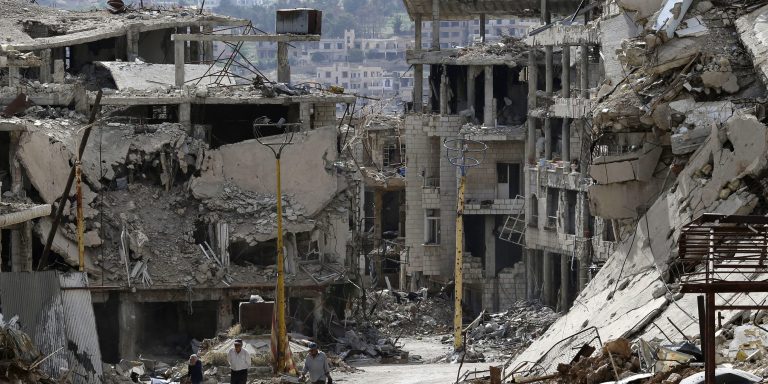INTELBRIEF
March 15, 2018
IntelBrief: Syria: Hell on Earth

- The United Nations Security Council-approved ceasefire has completely failed in its goal to provide relief in Eastern Ghouta.
- On March 12, UN Ambassador Nikki Haley directly blamed Russia for continuing to support the Assad regime’s relentless assault on the rebel-held Damascus suburb.
- More than one thousand Syrian children were killed or injured in the first two months of 2018.
- In the north of Syria, Turkey has encircled the Kurdish-held town of Afrin while the U.S. alliance with Syrian Kurds is collapsing.
.
The Syrian Civil War, a relentless tragedy, has become increasingly dangerous for civilians as outside influence increases. The situation in the besieged rebel-held town of Eastern Ghouta is worse now than when the United Nations Security Council unanimously approved a resolution calling for a 30-day ceasefire on February 20; it lasted less than a few hours before regime forces began bombing Eastern Ghouta again. Those attacks have continued—at a more intensive pace than before the ceasefire—and have killed more than one thousand civilians in the last three weeks.
The Assad regime has again used chemical weapons against the people of Eastern Ghouta, a heavily populated area comprised of numerous towns east of Damascus. The reports of chemical weapon use led US Ambassador to the UN, Nikki Haley, to again warn, in a March 12 speech to the Security Council, that the U.S. would act against any forces ‘determined to impose its will through chemical attacks and inhuman suffering, most especially the outlaw Syrian regime.’ The rising speculation and perhaps likelihood of a U.S military strike against Assad regime forces led to a blunt warning by the head of the Russian General Staff, Gen. Valery Gerasimov, who stated that Russia would respond with force against a U.S. strike. Russian forces are embedded with Assad forces across the country. This led to a direct call between General Gerasimov and Gen. Joseph Dunford, chairman of the U.S. Joint Chiefs of Staff.
While Russia and the U.S. circle each other, Syrian children continue to be killed. On March 6, the United Nations Children's Fund (UNICEF) reported that more than one thousand Syrian children were killed or injured in the first two months of 2018. Increasingly, the injured are struggling to receive care, as the Assad regime and Russian planes continue to target well-marked medical facilities. On March 8, Médecins Sans Frontières (Doctors Without Borders) stated that 15 of its 20 medical facilities in Ghouta had been hit with artillery or air strikes. On March 11, the Syrian Observatory for Human Rights (SOHR) released an estimate that 1099 civilians were killed in Ghouta since the start of the latest offensive on February 18. On March 14, at least 20 civilians were killed in a single day as the regime bombed the towns of Arbeen, Jesreen, Saqba, and Hamouria.
The Syrian war continues to devolve into multiple conflicts involving non-Syrian forces; in the north, Turkey has encircled the Kurdish-held town of Afrin. The situation is increasingly complicated. The Kurds had been the strongest partner and quasi-ally for the U.S. in its efforts to defeat the so-called Islamic State; Turkey strongly objects to the U.S support of Syrian Kurds and began to attack the Kurdish forces who had established a de facto semi-autonomous region along Turkey’s southern border. The U.S. has delicately tried to walk back some of its support for the Kurds, leaving the group to seek military backing from the Assad regime. On March 14, the Associated Press (AP) reported that at least eight Syrian soldiers were killed by Turkish air strikes while trying to defend Afrin against Turkish ground troops.
.
For tailored research and analysis, please contact: info@thesoufancenter.org